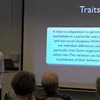breeding

Implicit Mind: De-Freuding Implicit Attitudes with Edouard Machery
Recording from "The Implicit Mind Workshop" in May 2015, held at the Institute for Futures Studies in Stockholm.
The ambivalence of desistance: Balancing in the liminal space between deviance and conventionality
European Journal of Criminology Abstract Building and expanding on contemporary research where desistance is increasingly conceived of asa fragile and liminal experience, this paper examines the early dof ambivalence – an undertheorised concept in life course criminology. This paper employs qualitativeinterviews from a total of 10 participants who participated in SIG, a voluntary defector programmein Sweden. Despite having formulated a clear resolve to desist, the participantsnonetheless experienced feelings of ambivalence in relation to the desistance process. In theseinstances, the aspiring desisters were bordering between the prospects of a better, crime-freelife and the pains, losses, struggles and frustrations accompanying the early stages of desistance.It is argued that this liminal position, where the old life is to be discarded and a new, better lifeis yet to be built, may constitute a breeding ground for ambivalence – a state which needs tobe grounded in the precarious social position of marginalised youth which aspiring desisters typicallyoccupy.
In Sweden we shake hands – but are we really?
Sociologisk Forskning, vol 54, no 4, pp 377–381. Abstract Motivated by a recent controversy over handshaking, a survey of the personal networks of young Swedes (n=2244) is used to describe greeting prac
The Long-Term Cognitive and Socioeconomic Consequences of Birth Intervals: A Within-Family Sibling Comparison Using Swedish Register Data
Demography, 54(2): 459-484, doi.org/10.1007/s13524-017-0550-x Abstract We examine the relationship between birth-to-birth intervals and a variety of mid- and long-term cognitive and socioeconomic outcom

Erica Falkenström
I am a researcher at the Institute for Futures Studies and an associated researcher at the Centre for Research Ethics & Bioethics (CRB) at Uppsala University. My research focuses on ethical dimensi
ERC Advanced Grant 2012 to Peter Hedström
Peter Hedström at the Institute for Futures Studies has been granted funding for a project called "Analytical sociology: Theoretical developments and empirical research”. 302 researchers in total were
Sweden's bumpy road to NATO membership: Political processes and moral dilemmas
Venue: Medelhavsmuseet, Fredsgatan 2 i Stockholm. We will be in Hörsalen, which is just behind Bagdad Café which will be open until 19.00. Register here > Abandoning its age-old doctrine of military n
Dan Wikler: Ethics, E-Cigs, and the Tobacco End Game
Full title: Ethics, E-Cigs, and the Tobacco End Game: Trading off mortality of the world's #1 cause of death in the near term, medium term, and long term future REGISTER HERE > Research seminar with DPlease note the time and that the speaker will join us online.
Transformative Experience and the Shark Problem
Philosophical Studies Abstract In her ground-breaking and highly influential book Transformative Experience, L.A. Paul makes two claims: (1) one cannot evaluate and compare certain experiential outcomes evaluate and compare certain intuitively horrible outcomes (e.g. being eaten alive by sharks) as bad and worse than certain other outcomes even if one cannot grasp what these intuitively horrible outcomes are like. We argue that the conjunction of these two claims leads to an implausible discontinuity in the evaluability of outcomes. One implication of positing such a discontinuity is that evaluative comparisons of outcomes will not be proportionally sensitive to variation in the underlying features of these outcomes. This puts pressure on Paul to abandon either (1) or (2). But (1) is central to her view and (2) is very hard to deny. We call this the Shark Problem.
Climate policy in British Columbia: An unexpected journey
Frontiers in Climate 4 Abstract Since introducing a path-breaking carbon tax in 2008, the western Canadian province of British Columbia (BC) has attracted significant attention from climate policy schola








